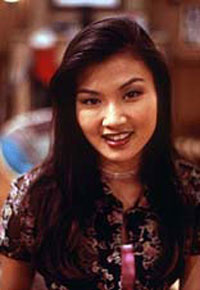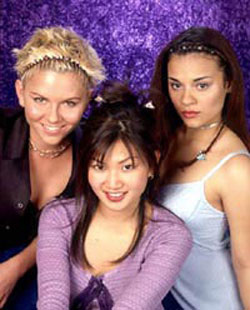Michelle Krusiec:
The Big Screen’s Chameleon Sweetheart
PAGE 2 OF 3
GOLDSEA | ASIAMS.NET | ASIAN AMERICAN PERSONALITIES
Michelle Krusiec:
The Big Screen’s Chameleon Sweetheart
GS: Describe shooting the love scenes with Lynn Chen
AW: It only took about 20 minutes to shoot. The anxiety leading up to it was longer. I was pretty nervous, because I wasn't sure what to expect. Both Lynn and I did a good job of trying to keep things calm and casual, but you could feel an undercurrent of nerves. We did a couple of takes and planned out some basic movements, but what you see on screen is pretty organic. Lynn also has really soft skin, so in between takes we would just lay there and chill out. I think I have soft skin too, but Lynn has never mentioned that to me.
GS: What compelled you to audition?
AW: I really fell in love with the story. It was poignant and so well told that I just wanted to be anyone in the movie at first. I thought Alice did such a remarkable job with all the characters that I was thoroughly impressed with her abilities as a writer and I was just eager to meet her.
GS: Tell us a little about turning your one woman show "Made in Taiwan" into a tv pilot.
AW: I'm in the process of selling it as a pitch idea, but it is only in its beginning stages. However, the creation of the stage show Made in Taiwan began years ago in college. It first began as an essay deconstructing my relationship to my mother. It was combined with a playwriting class and I later intended to perform it. It's taken me a number of years to slowly craft the story, but it's one of my proudest accomplishments. I feel as a story, it is both entertaining and deeply moving and as a writer, I like to think I wrote something very special. It's been a very rewarding process. The story is about a Mother who is obsessed with her husband's alleged adultery and raises her daughter in reaction to these eccentric fears.
GS: Paint a picture of your early childhood for us including a few Kodak moments
AW: Early childhood -- I remember not having a lot of money growing up and one day, a girl in the neighborhood got a bike for her birthday. Well, all of the neighborhood kids got to learn how to ride her bike that day. Each one of us took turns learning on her bike and her father or mother would push each one of us off on the bike, until we each got the hang of it. I really remember that very vividly.
One of the things my mom used to do was pack my lunches in elementary school. She used to pack the weirdest chinese food too, like marinated turkey drumsticks the size of like my whole arm. She would wrap it up in aluminum foil and I'd have to unwrap this huge turkey leg in front of all these white kids and eat it. I was so embarrassed. One time she packed a porkchop sandwich which was two pieces of bread, a porkchop and a whole tomato.
GS: What were some of the upsides to being brought up in a bicultural adoptive household?
AW: The upside to growing up bi-culturally is that you get to glean values from both Western American culture and the Chinese culture. For example, I have a good work ethic and I'm very grateful for things in America that I think most people take for granted. On the American side, I love the American sensibility for fun and a good time. I also think Americans, compared with other countries, have a high tolerance for diversity.
| < |

Krusiec as Sui Blake in ABC's One World (Courtesy of Annie Wang) |

